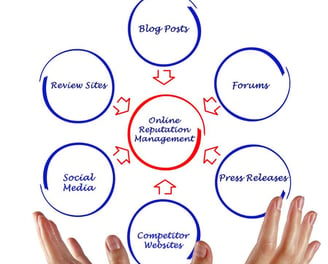What is Personal Reputation Management?
In the digital world, your online presence is like a permanent mark that everyone can see. Personal Reputation Management (PRM) has become crucial for creating a positive image of yourself in today’s connected world. PRM involves controlling how you appear online so that when someone searches for you, they find information that showcases the personal brand you’ve worked hard to build.
-
Definition: Personal Reputation Management is about monitoring and influencing how people see you online.
-
Relevance: With information about individuals being easily accessible online, your online reputation can affect your career and personal life.
-
Impact: Managing your online reputation well can bring new opportunities and strengthen your brand, while harmful content can harm your prospects.
-
Search Results: The first page of Google is often the first impression people have of you nowadays. It’s essential to make sure these search results positively present you.
In this article, we will explore strategies for Personal Reputation Management that will help you create a positive online image that reflects who you are and what you stand for. Suppose you’re serious about improving your online presence. In that case, services like Personal Reputation Management at Small Biz Optimize, which specializes in comprehensive Online Reputation Management, can be great partners on this journey. We also offer services such as website design and development, marketing strategy and planning, SEO optimization, personal and business brand development, and consultation sessions tailored to your needs.

Understanding Personal Reputation Management
In today’s digital world, personal reputation management is no longer a choice but a must-have. Let’s explore what it means and how it differs from managing a company’s reputation.
What Is Personal Reputation Management?
Personal reputation management is all about taking charge of your online presence and influencing how others perceive you. It focuses on controlling and shaping your digital narrative, making sure that the information available about you online accurately reflects who you are.
How Is It Different from Corporate Reputation Management?
While both personal and corporate reputation management involve managing how others see you, there are some key differences:
Scope: Corporate reputation management deals with shaping the image of a business or brand, while personal reputation management is about managing your individual online identity.
Audience: Corporate reputation management targets customers, investors, and other stakeholders, while personal reputation management is more concerned with how peers, employers, and potential clients perceive you.
Control: In corporate reputation management, the company has more control over its messaging and can use various channels to shape public opinion. On the other hand, individuals have limited control over what others say or share about them online.
Why Does Personal Reputation Management Matter?
Whether you’re a freelancer, an entrepreneur, or a professional looking to advance in your career, having a strong personal reputation can:
-
-
Build trust with clients and employers
-
Open doors to new opportunities
-
Enhance your credibility as an industry expert
-
Strengthen your professional network
On the flip side, neglecting your personal reputation or allowing negative information to dominate search results can:
-
-
-
Damage your professional prospects
-
Harm relationships with clients or colleagues
-
Lead to missed opportunities for growth
-
-
The Role of Social Media in Personal Reputation Management
One of the most significant factors influencing personal reputation today is social media. Platforms like Facebook, Twitter, LinkedIn, and Instagram play a crucial role in shaping public perception about individuals.
Social media presence plays a crucial part in shaping public perception about you. It acts as a public forum where people can express their views about you – both positive and negative.
Just think about it: When someone wants to know more about you, they are likely to turn to search engines and social media platforms. If your social media profiles show up first with positive content that reflects your personality and achievements accurately, it helps form a favourable impression.
To that end, it is essential to take control of your social media presence. Regularly updating your profiles, sharing relevant content, and engaging with your audience can help you shape a positive online persona.
Remember, personal reputation management is not about creating a false image but rather presenting the best version of yourself to the world.
The Process of Managing Your Personal Reputation
Managing your personal reputation requires a strategic approach. From assessing your online presence to monitoring it regularly, each step is crucial in shaping the way others see you. Let’s take a closer look at these key steps:
1. Conducting a Comprehensive Audit of Your Current Online Presence
The first step in managing your personal reputation is understanding where you currently stand. Here’s what you need to do:
-
Evaluate search results: Search for your name on Google and see what comes up. Look out for any outdated, irrelevant, or negative content.
-
Review social profiles: Go through your social media profiles and make sure that all the information there is up to date and presents you in a positive light.
-
Check tagged photos and posts: Sometimes, other people may tag you in posts or share photos of you that could affect your reputation. Take a look at these and remove or untag yourself from anything that doesn’t align with how you want to be seen.
2. Developing a Strategy to Address Any Existing Issues and Build a Stronger Reputation
Once you have a clear understanding of your online presence, it’s time to come up with a plan to improve it:
-
Prioritize issues: Identify the negative items that need immediate attention and focus on addressing them first. For example, if there’s an old blog post that portrays you in a negative light, consider reaching out to the website owner and asking if they can remove or update it.
-
Set clear objectives: Define what kind of image you want to project online. Think about how you want others to perceive you, both personally and professionally.
-
Plan for improvements: Look for opportunities to create positive content that showcases your skills, knowledge, or accomplishments. This could involve writing guest blog posts, sharing informative articles on social media, or creating videos showcasing your expertise.
3. Implementing the Strategy: Creating Positive Content, Optimizing Profiles, Engaging with Your Audience, etc.
Having a strategy is great, but it’s the actions you take that will make a real difference. Here are some steps you can take to manage your personal reputation effectively:
-
Create positive content: Share your thoughts and insights on topics related to your field of expertise through articles, blog posts, or social media updates. This will help establish you as a knowledgeable and trustworthy authority.
-
Optimize your profiles: Use search engine optimization (SEO) techniques to ensure that your social media profiles appear higher in search results. This can be done by including relevant keywords in your bio, using descriptive titles for your posts, and regularly updating your profiles with fresh content.
-
Engage with your audience: Actively participate in conversations and discussions on social media platforms. Respond to comments, answer questions, and share valuable resources. This will help you build relationships with others in your industry and show that you’re genuinely interested in engaging with them.
4. Monitoring and Maintaining Your Online Image Over Time
Managing your personal reputation is an ongoing process. Even if you’ve taken steps to improve it, you still need to stay vigilant. Here’s what you should do:
-
Regularly check your online presence: Set aside time every few months to review how you’re being portrayed online. Look for any new content or mentions of your name that could potentially impact your reputation.
-
Use alert systems: Take advantage of tools like Google Alerts, Mention, or Brand24 to receive notifications whenever someone mentions your name or brand online. This way, you can quickly respond to any negative comments or address any misunderstandings.
Be responsive: If you come across negative feedback or criticism about yourself online, don’t ignore it. Instead, take the time to understand the concerns being raised and respond in a calm and constructive manner. This will show others that you’re willing to listen and make amends if necessary.
By following these steps consistently, you’ll be able to maintain greater control over how you’re perceived online. Remember, your personal brand is an extension of who you are, so it’s important to manage it proactively and authentically.

Using Search Engine Optimization for Personal Reputation Management
When it comes to personal reputation management, Google search results often act as the first impression for anyone searching for you online. The content that appears on the first page of Google can greatly impact how you are perceived both personally and professionally. To make sure this initial online interaction reflects well on you, it’s important to understand and utilize search engine optimization (SEO) techniques.
Why Google Search Results Matter
-
First Impressions Count: People tend to make snap judgments, and what they see on Google can shape their opinion of you.
-
Opportunities Await: Employers, potential clients, and influencers might use search results to determine whether or not they want to connect with you.
-
Controlling Your Story: By influencing what shows up in search results, you have more control over how you’re portrayed online.
Key SEO Strategies
To increase your visibility on Google and effectively manage your personal brand, try implementing these SEO tactics:
1. Optimize Your Content
-
Use relevant keywords in your online content that reflect your profession, niche interests, or personal brand.
Make sure to consistently use your name across all platforms to strengthen your presence in search results.
2. Create High-Quality Content
-
Share articles, blog posts, or videos that offer valuable insights and highlight your expertise or positive qualities.
Collaborate with reputable websites or blogs to feature your content, expanding its reach and credibility.
3. Leverage Social Media Profiles
-
Stay active on platforms like LinkedIn, Twitter, and Instagram using your real name to increase visibility.
Share and promote content that aligns with the professional image you want to convey.
4. Build a Personal Website
-
Establish a professional website with your name as the domain.
Optimize it for SEO with a clear structure, meta descriptions, and titles that include relevant keywords.
5. Gain Backlinks
-
Encourage trustworthy sites to link back to your content or website.
Write guest posts for authoritative blogs in your industry, including links back to your personal site.
6. Monitor Your Search Results Regularly
-
Keep an eye on what shows up when you search for yourself on Google.
-
Adjust your approach as necessary based on the type of content ranking for your name.
By implementing these strategies, you’re actively shaping your online presence in a way that can lead to new opportunities. It’s about presenting an authentic image of yourself that resonates not only with who you currently are but also with who you aspire to become professionally.
Reputation Management Services: Should You Consider Hiring a Professional?
Reputation management services such as those provided by Reputation911 offer a comprehensive approach to managing your personal online reputation. These services aim to protect your online image, suppress any negative content, and promote positive narratives about you on the internet.
The offerings of these services often vary. However, they typically include:
-
Investigation and Analysis: A thorough examination of your existing online presence to identify any potential threats or negative content.
-
Content Suppression: Techniques are employed to push down negative search results and replace them with positive ones.
-
Content Creation: Development and promotion of positive content about you.
-
SEO Techniques: Utilizing SEO strategies to improve the visibility of positive content in search results.
-
Secure Profiles and Social Media Management: Establishing secure profiles on various platforms and managing social media accounts to ensure consistent messaging.
-
Monthly Status Reports: Regular reporting on the status of your online reputation, allowing for timely adjustments if necessary.
While these services can be incredibly helpful, it’s essential to weigh the pros and cons before deciding to seek external help.
Pros
-
Expertise: Reputation management companies have the expertise and tools necessary to effectively handle complex reputation issues.
-
Time-Saving: It can free up time that you would otherwise spend monitoring and managing your online reputation.
-
Ongoing Monitoring: These services often provide ongoing surveillance of your online image, helping you stay ahead of potential issues.
Cons
-
Cost: Professional reputation management services can be expensive depending on the level of service required. Here is a guide to the cost of online reputation management.
-
Loss of Personal Control: Entrusting your reputation to an external agency means losing some personal control over how you’re portrayed online.
While these pros and cons should be carefully considered, it’s worth mentioning that there are additional techniques that professionals employ to effectively manage one’s reputation. For instance, they can help with removing negative content from Google, which is crucial in maintaining a positive online image.
The role of ongoing monitoring and monthly status reports cannot be underestimated in managing one’s personal reputation. These reports provide insights into the state of your digital footprint, allowing you to understand better how you are perceived online and make adjustments as necessary.
Hence, it’s evident that choosing to hire a professional to manage your online reputation is a decision that needs careful consideration. It’s not just about suppressing the negative but also about creating and promoting the positive.
Case Studies: Examples of Successful Personal Reputation Management Strategies
Personal reputation management strategies can vary greatly, depending on the specific situation and individual involved. The effectiveness of these strategies often becomes evident through real-life examples. Two such instances involve a public figure and a private individual, each leveraging different methods to manage their online reputation successfully.
Case Study 1: A Public Figure
Consider a mid-level politician who found themselves at the center of a scandal due to false rumors. Their Google search results were filled with negative news articles and blog posts discussing these unverified claims.
The politician decided to take control of their online narrative by:
-
-
Creating targeted content: They started a personal blog, sharing insights into their political journey, views on pressing issues, and community work. This positive content gradually replaced the negative search results.
-
Leveraging social media profiles: Utilizing platforms like Twitter and LinkedIn, they shared achievements, interacted with followers, and showed their human side. This authentic engagement added a layer of trust to their image.
Case Study 2: A Private Individual
In contrast, consider an entrepreneur whose past business failure was overshadowing their current success in Google search results. They adopted the following strategies:
-
-
Proactively managing online presence: The entrepreneur began publishing insightful articles related to their industry on various platforms, effectively showcasing their expertise.
-
Optimizing social media profiles: They made sure all profiles were updated regularly with professional achievements and positive updates about the new venture.
In both cases, the individuals managed to overcome negative search results by creating fresh, relevant content that resonated with their audience and showcased them in a favorable light. They leveraged the power of authoritative social media profiles to engage directly with their audience and shape the public’s perception positively.
These case studies demonstrate that personal reputation management is not just for public figures or corporations but for anyone who wants to present themselves positively online. It involves consistent effort, strategic planning, and above all, authenticity.
Conclusion
The digital age has transformed the way personal reputations are built and maintained. With every click, post, and search, your personal brand takes shape in the online world. Vigilance in Personal Reputation Management is not just recommended; it’s essential for safeguarding your identity and unlocking doors to future opportunities.
Your digital footprint can either be a stepping-stone or a stumbling block on your professional and social paths. It’s the content you create, the interactions you have, and the stories told about you that collectively define your personal brand. Digital marketing plays a pivotal role in this narrative. By harnessing its tools—SEO, content creation, social media strategies—you take charge of how you’re perceived online.
Remember, curating a personal brand isn’t a one-off task but an ongoing journey. It requires consistent effort to foster an image that truly reflects who you are and aspire to be. Whether it’s securing your next job role, forming new partnerships, or simply making sure your online presence is an asset rather than a liability, Personal Reputation Management stands as the guardian of your digital self.
Ready to elevate your personal brand? Dive into the world of digital marketing to carve out a niche for yourself and ensure your online presence resonates with authenticity and professionalism.
FAQs (Frequently asked questions)
What is Personal Reputation Management and why is it relevant in today’s digital era?
Personal Reputation Management involves the process of managing one’s online image and ensuring that it accurately reflects their personal brand. In today’s digital era, where information is readily accessible and widely shared, maintaining a positive online reputation is crucial for safeguarding one’s identity and opportunities.
How does Personal Reputation Management impact personal brand and opportunities?
The impact of online reputation on personal brand and opportunities is significant. A positive online reputation can enhance one’s personal brand, open up new opportunities, and foster trust with potential employers, clients, or partners. Conversely, a negative online reputation can tarnish one’s personal brand and limit opportunities.
What are the key steps involved in effectively managing one’s personal reputation online?
The key steps involved in effectively managing one’s personal reputation online include conducting a comprehensive audit of your current online presence, developing a strategy to address any existing issues and build a stronger reputation, implementing the strategy by creating positive content and engaging with your audience, and monitoring and maintaining your online image over time.
How can Search Engine Optimization (SEO) be utilized for Personal Reputation Management?
Search Engine Optimization (SEO) can be utilized for Personal Reputation Management by employing key SEO techniques to improve visibility and control the narrative in search listings. This allows individuals to influence how they are perceived online by shaping the search results related to their name or personal brand.
Should I consider hiring a professional for Reputation Management Services?
The decision to seek external help for managing your personal reputation online depends on various factors. It’s important to weigh the pros and cons of hiring a professional reputation management service, considering the role of ongoing monitoring and reporting in sustaining a positive digital image. Companies like Reputation911 offer reputation management services along with monthly status reports.
Can you provide examples of successful Personal Reputation Management strategies?
Real-life examples of individuals who have effectively managed their personal reputations online serve as valuable case studies. These examples illustrate strategies such as overcoming negative search results through targeted content creation and leveraging the power of authoritative social media profiles to shape public perception positively.
“Explore more engaging articles to boost your personal and business accomplishments.”
Or check this article on how to Optimizing Flyer Design for Maximum Engagement.




